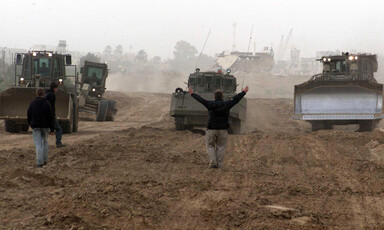
BBC Rachel Corrie coverage omits facts, lets lies go unchallenged
31 August 2012
Its coverage of the Rachel Corrie trial verdict marked a new low for the BBC. Read more about BBC Rachel Corrie coverage omits facts, lets lies go unchallenged

31 August 2012
Its coverage of the Rachel Corrie trial verdict marked a new low for the BBC. Read more about BBC Rachel Corrie coverage omits facts, lets lies go unchallenged

3 June 2009
Given their influence on world opinion and the vital importance of the settlement issue in resolving the Israeli-Palestinian conflict, can readers depend on the news agencies to provide fair coverage? The answer, sadly, is: no. Even on the most basic fact about the settlers — the number living on occupied Palestinian territory — the agencies regularly get it wrong. Jonathan Cook analyzes. Read more about Media agencies annex 200,000 settlers
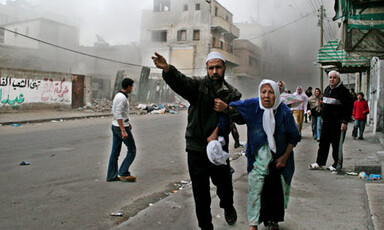
24 February 2009
A new study by Arab Media Watch demonstrates a strong tendency in the British press to represent Israel as “retaliating” in coverage of the Israeli-Palestinian conflict. The study, the first to investigate this aspect of British press coverage of the conflict, examined a period from January to June 2008. It found that when the British press represents a party as retaliating or responding in the conflict, that party is Israel 72 percent of the time. The tabloid press showed a particularly marked bias, representing Israel as retaliating in 100 percent of all representations of “retaliation.” Read more about Study: Israel "retaliates" to Palestinian "provocation" in UK press
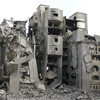
13 January 2009
US corporate media coverage of the Israeli military attacks that have reportedly killed more than 900 — many of them civilians — since 27 December has overwhelmingly failed to mention that indiscriminate attacks on civilian targets are illegal under international humanitarian law. Israel’s recent aerial attacks on Gazan infrastructure, including a TV station, police stations, a mosque, a university and even a United Nations school, have been widely reported. Yet despite the fact that attacks on civilian infrastructure, including police stations, are illegal (Human Rights Watch, 31 December 2008), questions of legality are almost entirely off the table in the US media. Read more about Study: International law seldom newsworthy in war on Gaza

8 January 2009
WASHINGTON (IPS) - Consumed by coverage of the 4 November presidential election, US mainstream media ignored a key Israeli military attack on a Hamas target that some Palestinians claim marked the effective end of the ceasefire between the two sides and set the stage for the current round of bloodletting. While the major US news wire Associated Press (AP) reported that the attack, in which six members of Hamas’s military wing were killed by Israeli ground forces, threatened the ceasefire, its report was carried by only a handful of small newspapers around the country. Read more about US media didn't report Israeli ceasefire violation

6 January 2009
To establish evidence of the BBC’s journalistic malpractice one often has to do no more than pick a random sample of news related to the Israeli-Palestinian conflict currently on its website. In a time of conflict BBC’s coverage invariably tends to the Israeli perspective, and nowhere is this reflected more than in the semantics and framing of its reportage. Muhammad Idrees Ahmad analyzes for The Electronic Intifada. Read more about The BBC: Eyeless in Gaza

18 August 2008
As Philip Giraldi points out in his 12 August article “America’s Israeli-Occupied Media” published on antiwar.com, the Israeli government is continuing its campaign to get the US military to attack Iran or at least give a “green light” for a massive Israeli bombing strike. In pursuit of this reckless and ill-conceived plan Tel Aviv has a willing co-conspirator in the mainstream American media, who will present the Israeli world-view without criticism or qualification. Ira Glunts analyzes. Read more about "60 Minutes" serves as Israeli propaganda mouthpiece
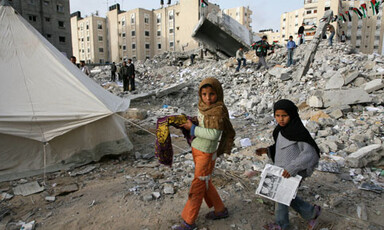
14 April 2008
On 22 March, The Miami Herald published an article entitled “Dreaming of a peaceful Mideast.” The initial reaction to such a headline is naturally one of pleased interest. Reporter Frida Ghitis praises the Israel/Palestine Centre for Research and Information for “working to create” a “culture of peace” in order to “put a stop to incitement and hatred.” Carol Scheller comments for EI. Read more about How Palestinian children really learn
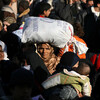
15 February 2008
Arab Media Watch expresses concern at the lack of critical commentary in the British press on Israel’s recent decision to intensify its siege of the Gaza Strip by withholding vital fuel supplies and increasing military attacks. Israel’s actions have resulted in civilian deaths, a worsening humanitarian crisis, the breach of Gaza’s border with Egypt, and bleaker prospects for the resumption of peace talks. Nonetheless, there has been no comment whatsoever in The Sun, Daily Mail, Daily Mirror, Daily Star and Evening Standard. Read more about British commentary pages ignore Gaza's plight
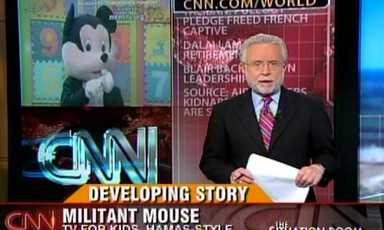
14 May 2007
Normally CNN, FOX, MSNBC and the New York Times have little in common with each other, let alone blogs like little green footballs, Americablog or the Huffington Post. But when it comes to disseminating Israel’s message, all are on the same page. On May 8, CNN, FOX and MSNBC began reporting on a Hamas-created children’s show, currently broadcast on Al Aqsa TV in Gaza, which features a Mickey Mouse-like cartoon character who does everything from teaching kids about the benefits of drinking milk to disseminating what CNN’s Jim Clancy described as “powerful message of HATE, RESISTANCE and DEFIANCE [sic]”. Read more about Mainstream media caught in the MEMRI mouse trap